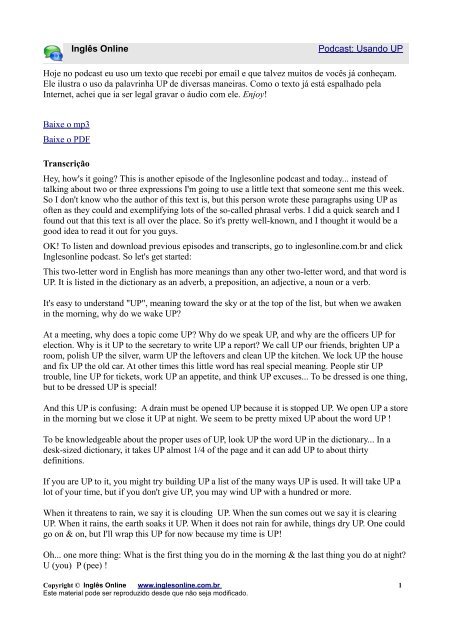Inglês Online Podcast: Usando UP Hoje no podcast eu uso um texto ...
Inglês Online Podcast: Usando UP Hoje no podcast eu uso um texto ...
Inglês Online Podcast: Usando UP Hoje no podcast eu uso um texto ...
Create successful ePaper yourself
Turn your PDF publications into a flip-book with our unique Google optimized e-Paper software.
<strong>Inglês</strong> <strong>Online</strong> <strong>Podcast</strong>: <strong>Usando</strong> <strong>UP</strong><br />
<strong>Hoje</strong> <strong>no</strong> <strong>podcast</strong> <strong>eu</strong> <strong>uso</strong> <strong>um</strong> <strong>texto</strong> que recebi por email e que talvez muitos de vocês já conheçam.<br />
Ele ilustra o <strong>uso</strong> da palavrinha <strong>UP</strong> de diversas maneiras. Como o <strong>texto</strong> já está espalhado pela<br />
Internet, achei que ia ser legal gravar o áudio com ele. Enjoy!<br />
Baixe o mp3<br />
Baixe o PDF<br />
Transcrição<br />
Hey, how's it going? This is a<strong>no</strong>ther episode of the Inglesonline <strong>podcast</strong> and today... instead of<br />
talking about two or three expressions I'm going to use a little text that someone sent me this week.<br />
So I don't k<strong>no</strong>w who the author of this text is, but this person wrote these paragraphs using <strong>UP</strong> as<br />
often as they could and exemplifying lots of the so-called phrasal verbs. I did a quick search and I<br />
found out that this text is all over the place. So it's pretty well-k<strong>no</strong>wn, and I thought it would be a<br />
good idea to read it out for you guys.<br />
OK! To listen and download previous episodes and transcripts, go to inglesonline.com.br and click<br />
Inglesonline <strong>podcast</strong>. So let's get started:<br />
This two-letter word in English has more meanings than any other two-letter word, and that word is<br />
<strong>UP</strong>. It is listed in the dictionary as an adverb, a preposition, an adjective, a <strong>no</strong>un or a verb.<br />
It's easy to understand "<strong>UP</strong>", meaning toward the sky or at the top of the list, but when we awaken<br />
in the morning, why do we wake <strong>UP</strong>?<br />
At a meeting, why does a topic come <strong>UP</strong>? Why do we speak <strong>UP</strong>, and why are the officers <strong>UP</strong> for<br />
election. Why is it <strong>UP</strong> to the secretary to write <strong>UP</strong> a report? We call <strong>UP</strong> our friends, brighten <strong>UP</strong> a<br />
room, polish <strong>UP</strong> the silver, warm <strong>UP</strong> the leftovers and clean <strong>UP</strong> the kitchen. We lock <strong>UP</strong> the house<br />
and fix <strong>UP</strong> the old car. At other times this little word has real special meaning. People stir <strong>UP</strong><br />
trouble, line <strong>UP</strong> for tickets, work <strong>UP</strong> an appetite, and think <strong>UP</strong> excuses... To be dressed is one thing,<br />
but to be dressed <strong>UP</strong> is special!<br />
And this <strong>UP</strong> is confusing: A drain must be opened <strong>UP</strong> because it is stopped <strong>UP</strong>. We open <strong>UP</strong> a store<br />
in the morning but we close it <strong>UP</strong> at night. We seem to be pretty mixed <strong>UP</strong> about the word <strong>UP</strong> !<br />
To be k<strong>no</strong>wledgeable about the proper uses of <strong>UP</strong>, look <strong>UP</strong> the word <strong>UP</strong> in the dictionary... In a<br />
desk-sized dictionary, it takes <strong>UP</strong> almost 1/4 of the page and it can add <strong>UP</strong> to about thirty<br />
definitions.<br />
If you are <strong>UP</strong> to it, you might try building <strong>UP</strong> a list of the many ways <strong>UP</strong> is used. It will take <strong>UP</strong> a<br />
lot of your time, but if you don't give <strong>UP</strong>, you may wind <strong>UP</strong> with a hundred or more.<br />
When it threatens to rain, we say it is clouding <strong>UP</strong>. When the sun comes out we say it is clearing<br />
<strong>UP</strong>. When it rains, the earth soaks it <strong>UP</strong>. When it does <strong>no</strong>t rain for awhile, things dry <strong>UP</strong>. One could<br />
go on & on, but I'll wrap this <strong>UP</strong> for <strong>no</strong>w because my time is <strong>UP</strong>!<br />
Oh... one more thing: What is the first thing you do in the morning & the last thing you do at night?<br />
U (you) P (pee) !<br />
Copyright © <strong>Inglês</strong> <strong>Online</strong> www.inglesonline.com.br<br />
Este material pode ser reproduzido desde que não seja modificado.<br />
1
<strong>Inglês</strong> <strong>Online</strong> <strong>Podcast</strong>: <strong>Usando</strong> <strong>UP</strong><br />
Don't mess <strong>UP</strong>. Send this on to everyone you look <strong>UP</strong> in your address book... It's <strong>UP</strong> to you! Now I<br />
think I'll shut <strong>UP</strong>.<br />
Alright, that's it. So tell me:<br />
• When was the last time you dressed up? For me, it was last Christmas.<br />
• Were you in any meetings recently? Which topics came up? I wasn't in any work meetings<br />
but when I talked to a friend last week, the topic of food came up.<br />
• What time do you usually wake up? I wake up at 7:30<br />
• What are you up to today? Me? I'm writing a couple of posts and working on some other<br />
stuff.<br />
Leave your answers in the comment area, and tell us which ways of using up you're familiar with.<br />
Talk to you next time.<br />
Copyright © <strong>Inglês</strong> <strong>Online</strong> www.inglesonline.com.br<br />
Este material pode ser reproduzido desde que não seja modificado.<br />
2


